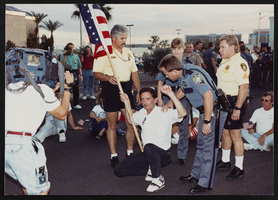Search the Special Collections and Archives Portal
Search Results

Jim Arnold, identifiation cards, and newspaper clipping, Culinary Union, Las Vegas (Nev.), 1976 and 1990s (folder 1 of 1), image 10
Date
1976 to 1990
Description
Arrangement note: Series III. Internal: Work
Image

Jim Arnold, identifiation cards, and newspaper clipping, Culinary Union, Las Vegas (Nev.), 1976 and 1990s (folder 1 of 1), image 11
Date
1976 to 1990
Description
Arrangement note: Series III. Internal: Work
Image

Jim Arnold, identifiation cards, and newspaper clipping, Culinary Union, Las Vegas (Nev.), 1976 and 1990s (folder 1 of 1), image 12
Date
1976 to 1990
Description
Arrangement note: Series III. Internal: Work
Image

Jim Arnold, identifiation cards, and newspaper clipping, Culinary Union, Las Vegas (Nev.), 1976 and 1990s (folder 1 of 1), image 13 (front)
Date
1976 to 1990
Description
Arrangement note: Series III. Internal: Work
Image

Jim Arnold, identifiation cards, and newspaper clipping, Culinary Union, Las Vegas (Nev.), 1976 and 1990s (folder 1 of 1), image 13 (back)
Date
1976 to 1990
Description
Arrangement note: Series III. Internal: Work
Image

Jim Arnold, identifiation cards, and newspaper clipping, Culinary Union, Las Vegas (Nev.), 1976 and 1990s (folder 1 of 1), image 14
Date
1976 to 1990
Description
Arrangement note: Series III. Internal: Work
Image

Jim Arnold, identifiation cards, and newspaper clipping, Culinary Union, Las Vegas (Nev.), 1976 and 1990s (folder 1 of 1), image 16
Date
1976 to 1990
Description
Arrangement note: Series III. Internal: Work
Image

Jim Arnold, identifiation cards, and newspaper clipping, Culinary Union, Las Vegas (Nev.), 1976 and 1990s (folder 1 of 1), image 17
Date
1976 to 1990
Description
Arrangement note: Series III. Internal: Work
Image

Jim Arnold, identifiation cards, and newspaper clipping, Culinary Union, Las Vegas (Nev.), 1976 and 1990s (folder 1 of 1), image 18
Date
1976 to 1990
Description
Arrangement note: Series III. Internal: Work
Image

Jim Arnold, identifiation cards, and newspaper clipping, Culinary Union, Las Vegas (Nev.), 1976 and 1990s (folder 1 of 1), image 19
Date
1976 to 1990
Description
Arrangement note: Series III. Internal: Work
Image
Pagination
Refine my results
Content Type
Creator or Contributor
Subject
Archival Collection
Digital Project
Resource Type
Year
Material Type
Place
Language
Records Classification
